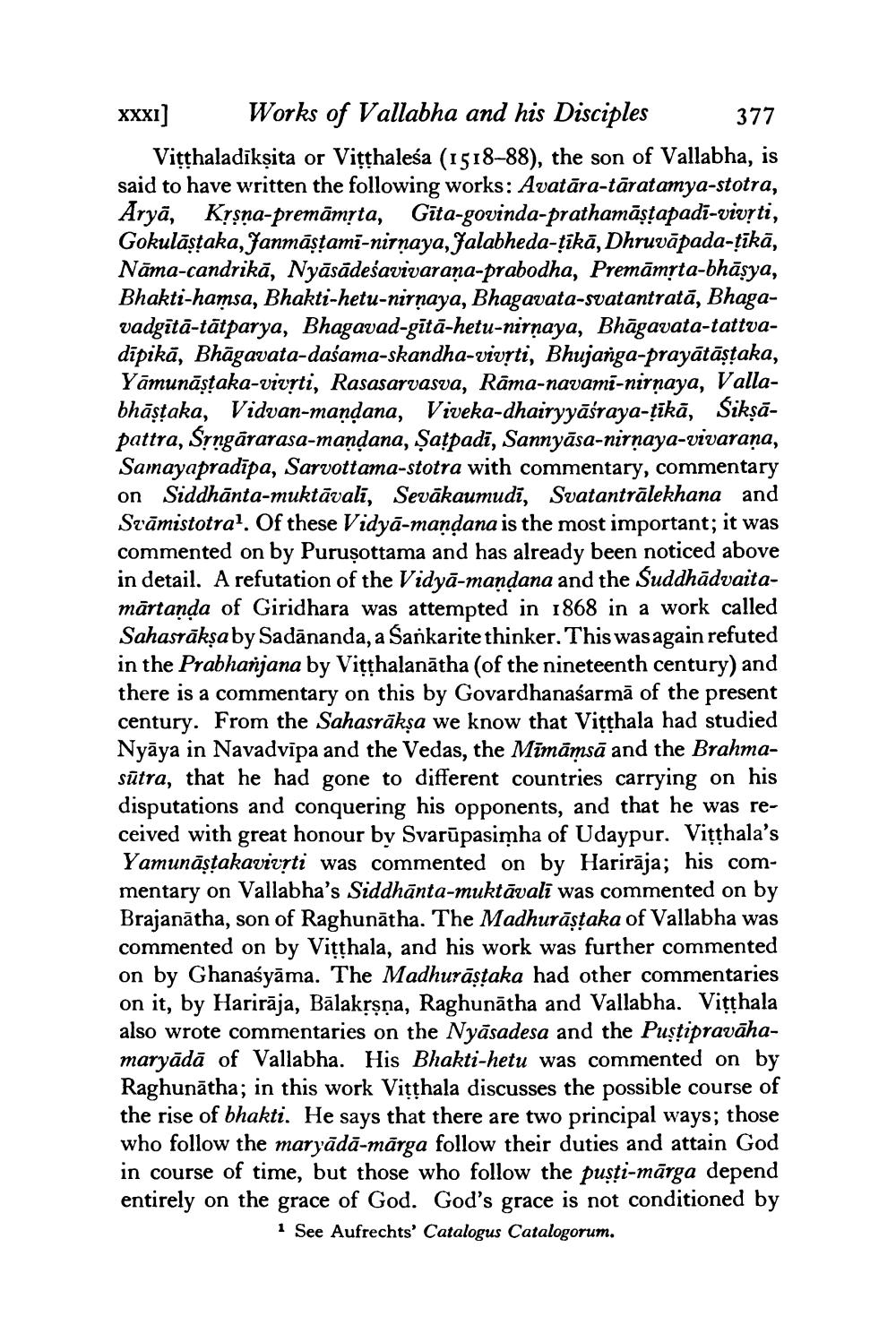________________
Works of Vallabha and his Disciples
377
Vitthaladikṣita or Vitthalesa (1518-88), the son of Vallabha, is said to have written the following works: Avatāra-tāratamya-stotra, Arya, Kṛṣṇa-premāmṛta, Gita-govinda-prathamāṣṭapadī-vivṛti, Gokulāṣṭaka, Janmāṣṭami-nirṇaya, Jalabheda-ṭīkā, Dhruvāpada-ṭīkā, Nāma-candrikā, Nyāsādeśavivaraṇa-prabodha, Premāmṛta-bhāṣya, Bhakti-hamsa, Bhakti-hetu-nirnaya, Bhagavata-svatantrată, Bhagavadgītā-tātparya, Bhagavad-gītā-hetu-nirṇaya, Bhāgavata-tattvadipika, Bhāgavata-daśama-skandha-vivṛti, Bhujanga-prayātāṣṭaka, Yamunaṣṭaka-vivṛti, Rasasarvasva, Rama-navami-nirnaya, Vallabhāṣṭaka, Vidvan-maṇḍana, Viveka-dhairyyāśraya-ṭīkā, Šikṣāpattra, Sṛngārarasa-manḍana, Satpadi, Sannyāsa-nirnaya-vivaraṇa, Samayapradipa, Sarvottama-stotra with commentary, commentary on Siddhanta-muktāvalī, Sevākaumudi, Svatantralekhana and Svāmistotra1. Of these Vidya-manḍana is the most important; it was commented on by Purusottama and has already been noticed above in detail. A refutation of the Vidya-mandana and the Suddhādvaitamartanda of Giridhara was attempted in 1868 in a work called Sahasrākṣa by Sadānanda, a Sankarite thinker. This was again refuted in the Prabhanjana by Viṭṭhalanatha (of the nineteenth century) and there is a commentary on this by Govardhanaśarma of the present century. From the Sahasrakṣa we know that Vitthala had studied Nyāya in Navadvipa and the Vedas, the Mīmāmsā and the Brahmasūtra, that he had gone to different countries carrying on his disputations and conquering his opponents, and that he was received with great honour by Svarupasimha of Udaypur. Vitthala's Yamunāṣṭakavivṛti was commented on by Hariraja; his commentary on Vallabha's Siddhānta-muktāvali was commented on by Brajanatha, son of Raghunatha. The Madhuraṣṭaka of Vallabha was commented on by Vitthala, and his work was further commented on by Ghanaśyama. The Madhuraṣṭaka had other commentaries on it, by Hariraja, Bālakṛṣṇa, Raghunatha and Vallabha. Vitthala also wrote commentaries on the Nyasadesa and the Puṣṭipravahamaryādā of Vallabha. His Bhakti-hetu was commented on by Raghunatha; in this work Vitthala discusses the possible course of the rise of bhakti. He says that there are two principal ways; those who follow the maryādā-mārga follow their duties and attain God in course of time, but those who follow the puşti-marga depend entirely on the grace of God. God's grace is not conditioned by 1 See Aufrechts' Catalogus Catalogorum.
XXXI]




